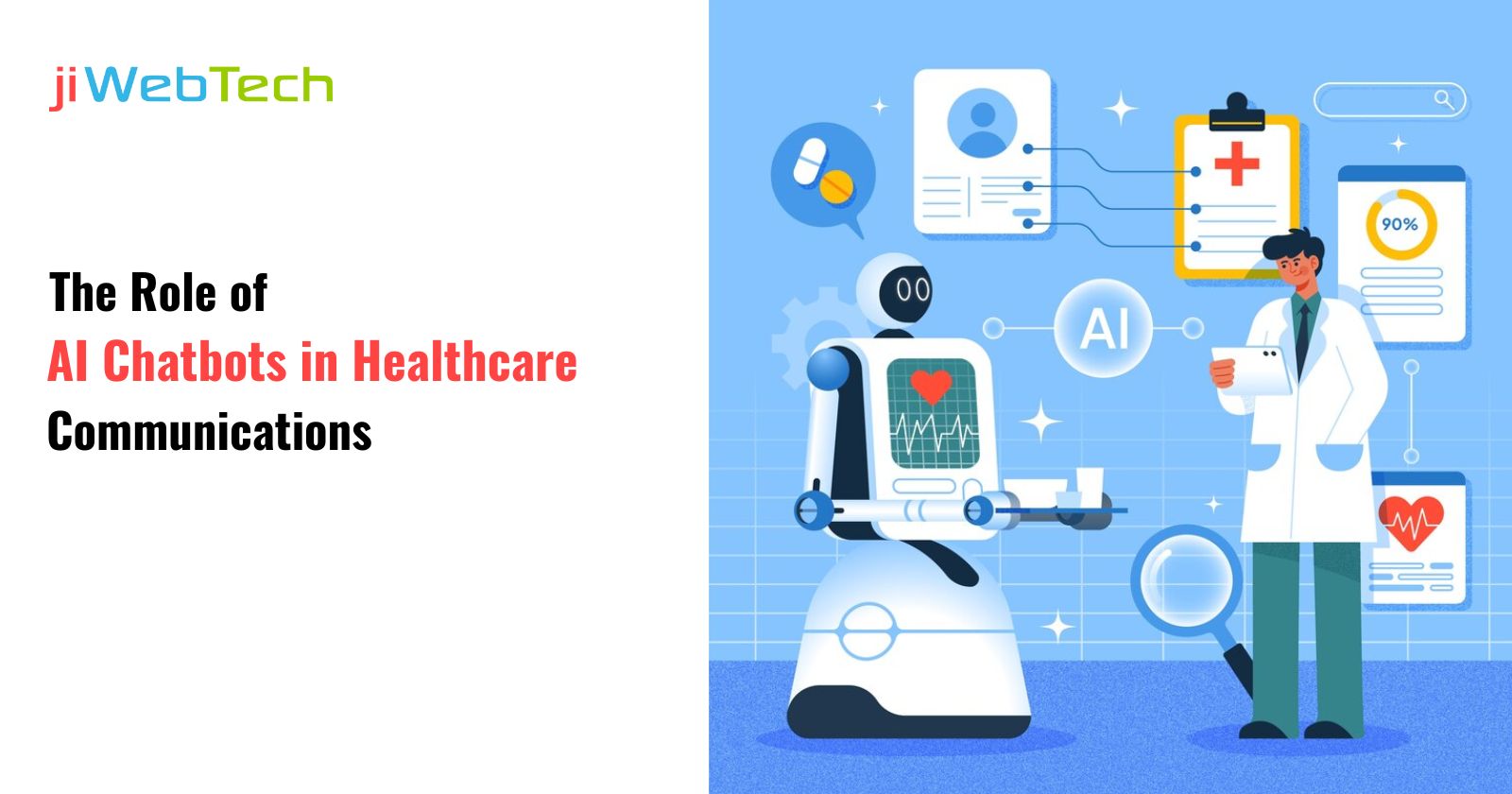- Dec 05, 2024
- Communication
- 2769
Share this post on:

The integration of Artificial Intelligence (AI) chatbots into healthcare communications is revolutionizing the way patients interact with healthcare systems. As digital health technologies continue to evolve, chatbots have emerged as vital tools that not only enhance patient engagement but also streamline administrative processes within healthcare organizations. This blog explores the multifaceted roles of AI chatbots in healthcare communications, highlighting their applications, benefits, challenges, and future prospects.
Understanding AI Chatbots in Healthcare
AI chatbots are sophisticated programs that utilize natural language processing (NLP) and machine learning algorithms to simulate conversations with users. In the healthcare sector, they serve various functions, including:
- Information Dissemination: Providing patients with instant access to medical information.
- Appointment Scheduling: Allowing patients to book, modify, or cancel appointments easily.
- Symptom Assessment: Assisting in preliminary diagnoses by evaluating patient-reported symptoms.
- Medication Management: Sending reminders for medication adherence and refills.
- Emotional Support: Offering mental health resources and empathetic interactions.
These functionalities not only improve patient experience but also optimize the workflow for healthcare providers.
Applications of AI Chatbots in Healthcare
1. Health Information Dissemination
One of the primary roles of AI chatbots in healthcare is to facilitate the dissemination of health information. They can provide real-time responses to patient inquiries about symptoms, treatments, and preventive measures. For instance, during the COVID-19 pandemic, chatbots were instrumental in delivering timely updates on symptoms and safety protocols through platforms like WhatsApp in collaboration with the World Health Organization (WHO).
2. Appointment Scheduling and Management
AI chatbots streamline appointment scheduling by allowing patients to book appointments at their convenience without needing to speak directly with a receptionist. They can send reminders and notifications about upcoming appointments, reducing no-show rates and improving clinic efficiency. This automation alleviates administrative burdens on staff, enabling them to focus on more complex tasks.
3. Symptom Assessment
Advanced AI chatbots can perform initial triage by asking patients targeted questions about their symptoms. Based on the responses, they can provide preliminary assessments or recommendations for further action. This capability not only speeds up the triage process but also helps prioritize urgent cases for healthcare professionals.
4. Medication Management
Chatbots play a crucial role in medication management by reminding patients when to take their medications and providing information about potential side effects or interactions. They can also assist in prescription refills by connecting directly with pharmacies. This proactive approach helps improve medication adherence among patients.
5. Emotional Support
AI chatbots are increasingly being used to provide emotional support and mental health assistance. They can engage users in empathetic conversations, offer coping strategies for stress and anxiety, and even detect signs of mental health disorders through conversational cues. While they do not replace human therapists, they serve as valuable resources for individuals seeking immediate support.
6. Workflow Management for Healthcare Professionals
Beyond patient interactions, chatbots assist healthcare professionals by automating routine administrative tasks such as updating medical records and managing patient data. This automation enhances operational efficiency within healthcare facilities, allowing providers to dedicate more time to direct patient care.
Benefits of AI Chatbots in Healthcare Communications
The integration of AI chatbots into healthcare communications offers numerous advantages:
24/7 Availability: Chatbots provide round-the-clock access to information and support, ensuring that patients can seek assistance at any time.
Efficiency: By automating routine tasks, chatbots reduce wait times for patients and free up staff resources.
Personalized Care: Chatbots can tailor interactions based on individual patient data, enhancing the relevance of the information provided.
Cost Reduction: Automating administrative processes leads to reduced operational costs for healthcare organizations.
Improved Patient Engagement: Continuous interaction through chatbots encourages patients to take an active role in managing their health.
Challenges Associated with AI Chatbots in Healthcare
Despite their many benefits, the implementation of AI chatbots in healthcare communications is not without challenges:
1. Data Privacy and Security: The handling of sensitive patient information raises significant concerns regarding data privacy and security. Ensuring compliance with regulations such as HIPAA (Health Insurance Portability and Accountability Act) is crucial for maintaining patient trust.
2. Limitations in Understanding Complex Queries: While AI chatbots have advanced significantly, they may still struggle with understanding complex medical queries or nuanced patient emotions. This limitation can lead to miscommunication or inadequate responses.
3. Dependence on Technology: Over-reliance on chatbot technology could diminish human interaction in healthcare settings, which is essential for building trust and rapport between patients and providers. Balancing technology use with personal care remains a critical consideration.
Future Prospects of AI Chatbots in Healthcare Communications
As technology continues to evolve, the role of AI chatbots in healthcare communications is expected to expand further:
1. Enhanced Personalization
Future advancements may enable chatbots to analyze vast amounts of patient data more effectively, leading to even greater personalization in care delivery. This could include tailored health education materials based on individual health profiles.
2. Integration with Wearable Technology
The integration of AI chatbots with wearable devices could facilitate real-time health monitoring and feedback. For example, a chatbot could provide immediate advice based on data collected from a patient's smartwatch regarding heart rate or activity levels.
3. Collaborative Care Models
AI chatbots could play a pivotal role in collaborative care models where they assist not only patients but also healthcare teams by providing relevant information swiftly during care coordination meetings. This collaborative approach could enhance decision-making processes within multidisciplinary teams.
Conclusion
AI chatbots are transforming healthcare communications by enhancing accessibility, streamlining processes, and improving patient engagement. Their diverse applications—from providing health information to managing appointments—demonstrate their potential as valuable tools within the healthcare ecosystem. While challenges such as data privacy concerns and limitations in understanding complex queries persist, ongoing advancements in AI technology promise a future where these virtual assistants will play an even more integral role in promoting efficient and effective healthcare delivery.
As we look ahead, it is clear that the integration of AI chatbots into healthcare communications will continue to evolve, offering new opportunities for improved patient outcomes and enhanced operational efficiency within healthcare organizations. The journey towards fully harnessing the potential of this technology is ongoing; however, its impact on the future of healthcare communication is undeniable. Want to learn more how AI chatbots can help your enhance your business? Look no further than jiWebTech. We have a team of expert developers who have helped numerous businesses improve healthcare by integrating chatbots. Contact us today to learn more.
Frequently Asked Questions
What are AI chatbots, and how do they work in healthcare?
AI chatbots are computer programs designed to simulate human conversation using natural language processing (NLP) and machine learning algorithms. In healthcare, they assist patients by providing information, scheduling appointments, assessing symptoms, managing medications, and offering emotional support. They work by interpreting user input and generating relevant responses based on pre-programmed data and machine learning models.
What are the main benefits of using AI chatbots in healthcare?
The primary benefits of AI chatbots in healthcare include:
• 24/7 Availability: Patients can access information and support at any time.
• Efficiency: Chatbots automate routine tasks, reducing wait times and freeing up staff resources.
• Personalized Care: They can tailor interactions based on individual patient data.
• Cost Reduction: Automation leads to decreased operational costs for healthcare organizations.
• Improved Patient Engagement: Continuous interaction encourages patients to take an active role in managing their health.
Are there any challenges associated with using AI chatbots in healthcare?
Yes, there are several challenges, including:
• Data Privacy and Security: Handling sensitive patient information raises concerns about compliance with regulations like HIPAA.
• Limitations in Understanding Complex Queries: Chatbots may struggle with nuanced medical questions or emotional cues.
• Dependence on Technology: Over-reliance on chatbots could reduce human interaction, which is essential for building trust between patients and providers.
How can AI chatbots improve patient engagement?
AI chatbots enhance patient engagement by providing instant access to information and resources, facilitating appointment scheduling, sending medication reminders, and offering support for mental health. Their ability to interact with patients continuously encourages individuals to be more proactive in managing their health, leading to better adherence to treatment plans and improved health outcomes.
What does the future hold for AI chatbots in healthcare communications?
The future of AI chatbots in healthcare looks promising, with anticipated advancements including enhanced personalization through machine learning, integration with wearable technology for real-time health monitoring, and improved collaborative care models. As technology evolves, chatbots are expected to play an even more significant role in facilitating efficient communication and care delivery within the healthcare system.









